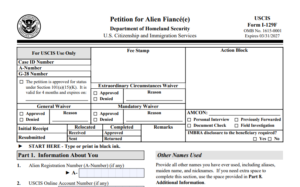The United States Citizenship and Immigration Services (“USCIS”) has issued new guidelines in the agency’s policy manual in determining when an immigrant visa number “becomes available” for purposes of calculating an immigrant visa applicant’s age under the Child Status Protection Act (“CSPA”).
In order for a child to be issued an immigrant visa or be approved for lawful permanent resident status and obtain a “Green Card” in the United States based on their parent’s approved petition for a family-sponsored preference category or an employment-based immigrant visa, the child must be under 21 years of age. If the child turns 21, they are generally considered to have “aged-out” and are no longer eligible to immigrate based on their parent’s petition.
The CSPA was enacted by the United States Congress in order to protect children from losing their eligibility to be issued an immigrant visa or be approved for a Green Card by providing a method to calculate the child’s age that considers when an immigrant visa number “becomes available.” This is determined by the United States Department of State Visa Bulletin. The Visa Bulletin, which is updated monthly, has two charts – the final action dates chart and the dates for filing chart. Under the previous CSPA guidance, USCIS considered an immigrant visa to be available for purposes of CSPA age calculation based only on the final action date chart and not the date for filing chart even if the immigrant visa applicant could apply for a green card using the date for filing chart.
The new USCIS policy change is effective immediately and applies to pending applications. As a result, some immigrant visa applicants who had a CSPA age that was over 21 under the previous policy will now have a CSPA age of under 21.
With the new guidance, in which USCIS will now use the dates for filing chart to calculate an immigrant visa applicant’s age for CSPA purposes, this will provide more certainty concerning eligibility. However, the new policy will not prevent all immigrant visa applicant children from aging out.
For more information, contact us at info@enterlinepartners.com and speak with an experienced U.S. immigration lawyer in Ho Chi Minh City, Manila and Taipei.
ENTERLINE & PARTNERS CONSULTING
Ho Chi Minh City, Vietnam Office
Suite 601, 6th Floor, Saigon Tower
29 Le Duan Street
Ben Nghe Ward, District 1
Ho Chi Minh City, Vietnam
Tel: +84 933 301 488
Email: info@enterlinepartners.com
Facebook: Enterline & Partners – Dịch vụ Thị thực và Định cư Hoa Kỳ
YouTube: @EnterlineAndPartnersConsulting
Website: http://enterlinepartners.com
Manila, Philippines Office
Tel: +63 917 543 7926
Email: info@enterlinepartners.com
Facebook: Enterline and Partners Philippines
Website: https://enterlinepartners.com/language/en/welcome/
Copyright 2023. This article is for information purposes only and does not constitute legal advice. This article may be changed with or without notice. The opinions expressed in this article are those of Enterline and Partners only.








